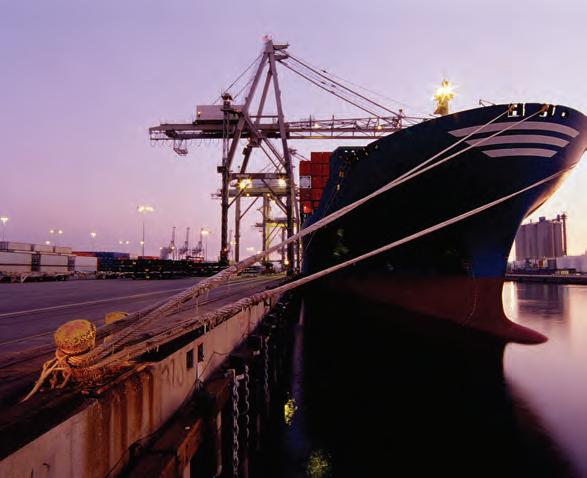
3 minute read
The Business Pulse
According to the ‘Business Pulse’ Survey of the Hellenic Federation of Enterprises (2022):
• Reforms are improving the business environment, according to the Indexes of Macro and Micro Obstacles (4.9 and 4.8 points respectively, with an optimum of 1). There is significant improvement in the level of tax rates (extreme difficulty fell from 70.6% to 45.5%)
Advertisement
• Companies expect a gradual recovery of the economy as they positively assess their current and future status, with the highest percentages since 2017 (46% and 42% respectively); also 55% expect their turnover to increase in the next year
• 53.7% believe that the measures to support companies in response to the pandemic are effective
• Digital public administration services show the importance of digital transformation for a more efficient economy; over 58% of businesses rate the top 3 digital public sector agencies positively
• Investment plans remain unchanged for 62% of large companies despite the pandemic, highlighting the importance of achieving critical mass to ensure that companies remain resilient, and the economy grows
• 72% of companies are concerned about price increases including in the cost of raw materials, as well as transport and energy costs; the prospect for absorption without increases is price lists is not promising
• Companies with more than 10 employees are concerned about high energy costs, as they consider it as the main obstacle to their daily operations (micro environment)
• 70% of companies have high expectations of the National Recovery and Resilience Plan and believe it will make a positive contribution to the economy
• For a minority but significant part of the market, the need for raising awareness of the challenges of green growth is identified, as only 28.7% of small companies consider it very or extremely important (compared to 50% in large companies)
Market characteristics
Despite the positive figures, disparities like corporate size and diversification of business activities can delay a fast convergence to EU standards and financial return. Small and medium-sized enterprises stand out compared to larger 3PL providers. Smaller 3PL may add flexibility to the sector but size is evident in key business figures like sales, volume, investments, ROA, etc.
This fragmentation has led manufacturing and traders to insource logistics in a ratio of 80-20, while in many EU countries this ratio is often reversed. Insourced logistics are still dominant, which mainly links to red tape and regulatory barriers in 3PL and truck operations.
A recent study by SEV, backs the argument that digitalization of all supply chain activities in Greece can impact significantly on the sector’s financial performance as well as on fiscal revenue. For example
• e-tracing may offer up to 45% time reduction in warehouse management and 25% increased labor efficiency
• up to €200m may increase in tax revenue by reducing smuggling
• up to €1,4b annual savings in transaction costs, assuming that Greece meets the average EU use of e-procurement.
• 20% - 50% cost reduction due to improved controls on containers and documents
• up to €1,4b savings from universal use of e-invoicing at the private sector
• up to 80% reduction of fake / bogus tax documents with a significant increase of tax revenue
But much of this is hampered by inconsistencies in EDI, shipment sizes, customs documents, proof of delivery, e-signature validation, etc. An increasingly competitive environment is another big factor in the mix. Many of the sector’s own customers still insource logistics by 80%, while 3PL players are finding ways to carve out the more lucrative elements of the value chain.
Sharing is yet another big game changer for Greek logistics now – from Uber-style approaches to last-mile delivery, urban consolidation centres, JVs and partnerships, the whole sector is trying to redefine collaboration.
Scale-up, shake up: Market synergies can have a big impact
This can address the complex competition currently in Greece where large industrial or retail customers and suppliers become players in the logistics market themselves. They are not just managing their own logistics but are turning that expertise into a profitable business model. In addition, the current market leaders will soon compete το acquire market share from smaller players (or even acquire the smaller players themselves), achieving scale through consolidation and innovation.
Investment opportunities
A major investment will be underway at Thriasio Logistics Park soon, and the Transportation Cluster Park at Fili- Attica (2024). Both of these clusters are expected to create a state of the art hub, connected with the port as well as with railway corridors to central Europe.
Additional investment opportunities include the following sample cases (SEV Survey):
• A logistics cluster centered on Piraeus trade gate, coupled with international marketplaces and showrooms. The trade gate can also benefit from a new business / financial hub which will raise interest in real estate
• Although Piraeus port has yet to take full advantage of its investments, the setup of a trade gate around Thessaloniki port combined with an agro-hub at Sindos and/or Gonos sites, can provide a significant investment opportunity which may boost regional economy by €2b (10% of regional GDP) approx. The privatization of Thessaloniki port supports further this trade gate

• Dry ports in areas like Volos, Alexandroupolis, Kavala, etc. Such hubs may supplement the operation of Piraeus and Thessaloniki ports
• Small-to-medium size agro-hubs to capitalize regional production
• Digital applications throughout the supply chain (from customs to consumers) which will increase efficiency and transparency of all logistics transactions

• Operational re-engineering towards synergies, market consolidation, load optimization and outsourcing, as outlined in previous sections
• PPPs for seaplane transport, railway line to Lavrio port, etc.











